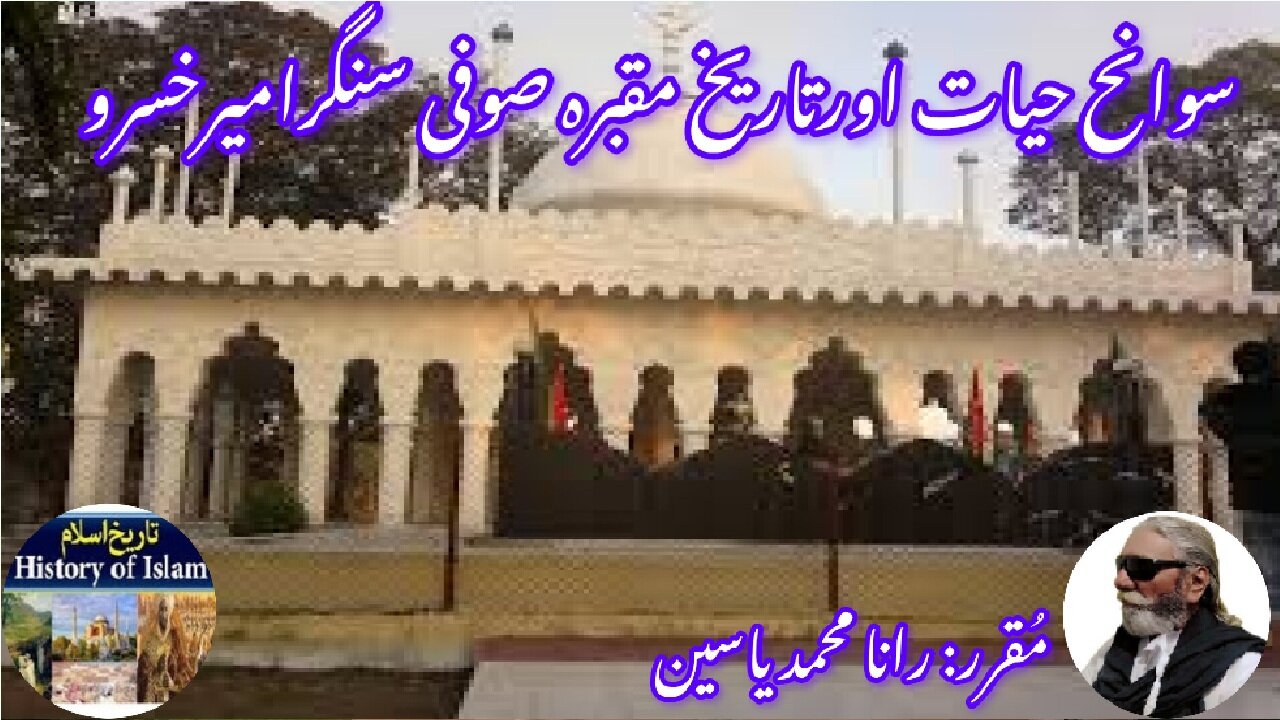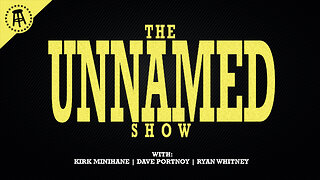Premium Only Content

Biography of sufi singer Amir Khusrau | सूफी गायक अमीर खुसरो | صوفی گلوکار امیر خسرو کی سوانح عمری
@islamichistory813 #IslamicScholar #SufiTradition #HistoricalShrine #sufisinger #AmirKhusrau
Biography of Islamic Scholar sufi singer Amir Khusrau
Dekhti Aankhooon aur sountay kaanoon ko Asslamoalaikum, sisters, brothers friends and elders, In this islamic sufi scholars informative video, we are presenting the biography of Amir Khusrau, an illustrious Islamic scholar and Sufi musician whose works have transcended time. The narrative not only covers his life and artistic achievements but also examines the history of his shrine, situated in a significant location that attracts numerous visitors. Through this exploration, we aim to shed light on the spiritual and cultural importance of Amir Khusrau's legacy.
Abul Hasan Yamin ud-Din Khusrau better known as Am?r Khusrau, was an Indo-Persian Sufi singer, musician, poet and scholar, who lived during the period of the Delhi Sultanate.
He is an iconic figure in the cultural history of the Indian subcontinent. He was a mystic and a spiritual disciple of Nizamuddin Auliya of Delhi, India. He wrote poetry primarily in Persian, but also in Hindavi. A vocabulary in verse, the khaliq Bari, containing Arabic, Persian and Hindavi terms is often attributed to him. Khusrau is sometimes referred to as the "voice of India" or "Parrot of India" (Tuti-e-Hind), and has been called the "father of Urdu literature."
Khusrau is regarded as the "father of qawwali" (a devotional form of singing of the Sufis in the Indian subcontinent), and introduced the ghazal style of song into India, both of which still exist widely in India and Pakistan. Khusrau was an expert in many styles of Persian poetry which were developed in medieval Persia, from Kh?q?n?'s qasidas to Nizami's khamsa. He used 11 metrical schemes with 35 distinct divisions. He wrote in many verse forms including ghazal, masnavi, qata, rubai, do-baiti and tarkib-band. His contribution to the development of the ghazal was significant.
Amir Khusrau was born in 1253 in Patiyali, Kasganj district, in modern-day Uttar Pradesh, India, in what was then the Delhi Sultanate, the son of Amir Saif ud-Din Mahm?d, a man of Turkic extraction and Bibi Daulat Naz, a native Indian mother. Amir Saif ud-Din Mahmud was a Sunni Muslim. He grew up in Kesh, a small town near Samarkand in what is now Uzbekistan. When he was a young man, the region was destroyed and ravaged by Genghis Khan's invasion of Central Asia, and much of the population fled to other lands, India being a favored destination. A group of families, including that of Amir Saif ud-Din, left Kesh and travelled to Balkh (now in northern Afghanistan), which was a relatively safe place; from there, they sent representatives to the Sultan of distant Delhi seeking refuge. This was granted, and the group then travelled to Delhi. Sultan Shams ud-Din Iltutmish, ruler of Delhi, was also Turkic like them; indeed, he had grown up in the same region of Central Asia and had undergone somewhat similar circumstances in earlier life. This was the reason the group had turned to him in the first place. Iltutmish not only welcomed the refugees to his court but also granted high offices and landed estates to some of them. In 1230, Amir Saif ud-Din was granted a fief in the district of Patiyali.
Amir Saif ud-Din married Bibi Daulat Naz, the daughter of Rawat Arz, an Indian noble and war minister of Ghiyas ud-Din Balban, the ninth Sultan of Delhi.
Amir Saif ud-Din and Bibi Daulatnaz became the parents of four children: three sons (one of whom was Khusrau) and a daughter. Amir Saif ud-Din Mahmud died in 1260, when Khusrau was only eight years old. Through his father's influence, he imbibed Islam and Sufism coupled with proficiency in Turkish[clarification needed], Persian, and Arabic languages. He was known by his sobriquet Tuti-i Hind ("Parrot of India"), which according to the Encyclopaedia of Islam "compares the eloquent poet to the sweet-talking parrot, indicates his canonical status as a poet of Persian." Khusrau's love and admiration for his motherland is transparent through his work.
Khusrau was an intelligent child. He started learning and writing poetry at the age of nine. His first divan, Tuhfat us-Sighr (The Gift of Childhood), containing poems composed between the ages of 16 and 18, was compiled in 1271. In 1273, when Khusrau was 20 years old, his grandfather, who was reportedly 113 years old, died.
In 1310, Khusrau became a disciple of Sufi saint of the Chishti Order, Nizamuddin Auliya. In 1315, Khusrau completed the romantic masnavi Duval Rani - Khizr Khan (Duval Rani and Khizr Khan), about the marriage of the Vaghela princess Duval Rani to Khizr Khan, one of Ala ud-Din Khalji's sons.
After Ala ud-Din Khalji's death in 1316, his son Qutb ud-Din Mubarak Shah Khalji became the Sultan of Delhi. Khusrau wrote a masnavi on Mubarak Shah Khalji called Nuh Sipihr (Nine Skies), which described the events of Mubarak Shah Khalji's reign. He classified his poetry in nine chapters, each part of which is considered a "sky". In the third chapter he wrote a vivid account of India and its environment, seasons, flora and fauna, cultures, scholars, etc. He wrote another book during Mubarak Shah Khalji's reign by name of Ijaz-e-Khusravi (The Miracles of Khusrau), which consisted of five volumes. In 1317 Khusrau compiled Baqia-Naqia (Remnants of Purity). In 1319 he wrote Afzal ul-Fawaid (Greatest of Blessings), a work of prose that contained the teachings of Nizamuddin Auliya.
In 1320, Mubarak Shah Khalji was killed by Khusro Khan, who thus ended the Khalji dynasty and briefly became Sultan of Delhi. Within the same year, Khusro Khan was captured and beheaded by Ghiyath al-Din Tughlaq, who became Sultan and thus began the Tughlaq dynasty. In 1321, Khusrau began to write a historic masnavi named Tughlaq Nama (Book of the Tughlaqs) about the reign of Ghiyath al-Din Tughlaq and that of other Tughlaq rulers.
Khusrau is credited with fusing the Persian, Arabic, Turkic, and Indian singing traditions in the late 13th century to create qawwali, a form of Sufi devotional song. A well-punctuated chorus emphasising the theme and devotional refrain coupled with a lead singer utilising an ornate style of fast taans and difficult svara combinations are the distinguishing characteristics of a qawwali. Khusrau's disciples who specialised in Qawwali singing were later classified as Qawwals (they sang only Muslim devotional songs) and Kalawants (they sang mundane songs in the Qawwali style). The musical flow of some of his poems has made them favorites of musicians even today
Tarana and Trivat are also credited to Khusrau. Musicologist and philosopher Jaidev Singh has said: Tarana was entirely an invention of Khusrau. Tarana is a Persian word meaning a song. Tillana is a corrupt form of this word. True, Khusrau had before him the example of Nirgit songs using susk-aksaras (meaningless words) and pat-aksaras (mnemonic syllables of the mridang). Such songs were in vogue at least from the time of Bharat. But generally speaking, the Nirgit used hard consonants. Khusrau introduced two innovations in this form of vocal music. Firstly, he introduced mostly Persian words with soft consonants. Secondly, he so arranged these words that they bore some sense. He also introduced a few Hindi words to complete the sense…. It was only Khusrau's genius that could arrange these words in such a way to yield some meaning. Composers after him could not succeed in doing so, and the tarana became as meaningless as the ancient Nirgit. It is believed that Khusrau invented the tarana style during his attempt to reproduce Gopal Naik's exposition in raag Kadambak. Khusrau hid and listened to Gopal Naik for six days, and on the seventh day, he reproduced Naik's rendition using meaningless words (mridang bols) thus creating the tarana style.
Khusrau died in October 1325, six months after the death of Nizamuddin Auliya. Khusrau's tomb is next to that of his spiritual master in the Nizamuddin Dargah in Delhi. Nihayat ul-Kamaal (The Zenith of Perfection) was compiled probably a few weeks before his death.
Sisters brothers friends, and elders, now give us permission, up to tomorow, and tomorow we will described Biography of Sufi Islamic Scholar Amir Kulal. Allah Hafiz
=============================
-
 LIVE
LIVE
The Charlie Kirk Show
1 hour agoInside the Transition + The Bathroom Battle + Ban Pharma Ads? | Rep. Mace, Tucker, Carr | 11.21.24
12,095 watching -
 59:20
59:20
The Dan Bongino Show
4 hours agoBitter CNN Goes After Me (Ep. 2375) - 11/21/2024
612K2.02K -
 LIVE
LIVE
TheAlecLaceShow
2 hours agoGuests: Alex Marlow & Terry Schilling | Justice For Laken Riley | Russian ICBM | The Alec Lace Show
113 watching -
 LIVE
LIVE
Danny Haiphong
1 hour agoMARK SLEBODA & SCOTT RITTER: NATO ATTACKS RUSSIA, PUTIN FIRES ICBM WARNING SHOT AT UKRAINE—WW3 NEXT?
970 watching -
 40:47
40:47
Dave Portnoy
5 hours agoThe Unnamed Show With Dave Portnoy, Kirk Minihane, Ryan Whitney - Episode 37
20.5K1 -
 51:53
51:53
The Rubin Report
2 hours agoCrowd Shocked by Ben Affleck’s Unexpected Take on This Massive Change
53K34 -
 2:07:25
2:07:25
Steven Crowder
4 hours agoBREAKING: Russia Launches ICBM for First Time in History - What Happens Next?
378K182 -
 LIVE
LIVE
The Shannon Joy Show
5 hours ago🔥🔥While Americans Are Watching WWE Politics: Australia Is Ramping Up MANDATORY Digital ID🔥🔥
528 watching -
 2:03:36
2:03:36
LFA TV
15 hours agoTHE FIGHT IN ONLY BEGINNING! | LIVE FROM AMERICA 11.21.24 11am EST
46.7K18 -
 1:18:10
1:18:10
Graham Allen
5 hours agoPutin Vows Peace With Trump But WAR Under Biden!! + 400,000 Kids Are MISSING?!
116K206